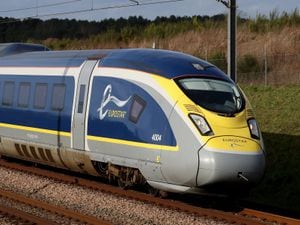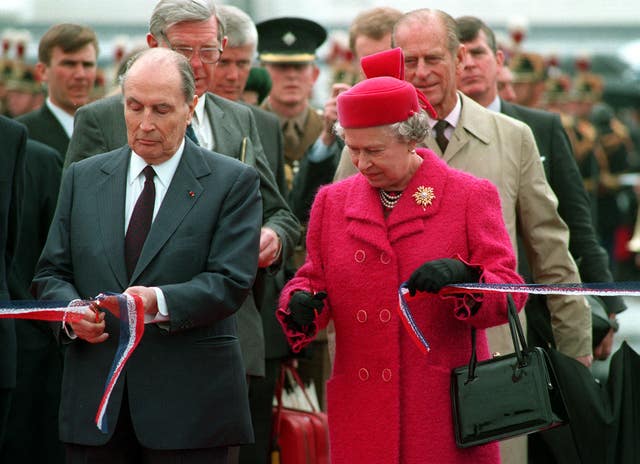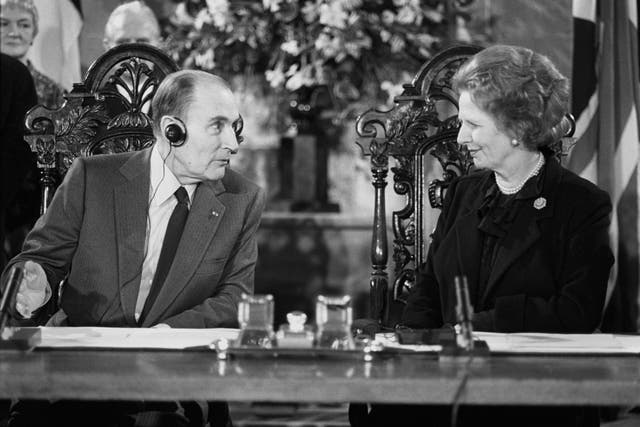Call for Eurostar to face competition as Channel Tunnel turns 30
Mark Smith, founder of international train travel website Seat61.com, said introducing a rival operator could lead to lower fares.

An international rail travel expert has called for Eurostar to face direct competition, as the Channel Tunnel turns 30 years old on Monday.
Mark Smith, founder of international train travel website Seat61.com, said having a second company operating passenger train services to the continent could lead to lower fares and new destinations.
Eurostar holds a monopoly in running passenger services through the tunnel, which was officially opened on May 6 1994 by Queen Elizabeth II and France’s then-president Francois Mitterrand.
But Mr Smith said there are “people waiting in the wings to compete”.
Spanish start-up company Evolyn is aiming to launch services through the tunnel next year, while billionaire entrepreneur Sir Richard Branson is reportedly also developing a rival operation.
Mr Smith said: “I love Eurostar’s service but competition keeps everyone on their toes and it certainly keeps prices down.
“That I think is the important thing at the moment.
“Prices have risen recently because of the extra Brexit checks limiting capacity at St Pancras.
“We know that competition will keep a lid on those prices.

“We might see some extra destinations. The obvious one is Germany. A direct train to Cologne would be wonderful if they could find the space to put terminal facilities there.”
Eurostar’s routes to and from the UK are limited to between London St Pancras and Paris, Brussels, Lille, Rotterdam and Amsterdam.
Mr Smith said Eurostar is only running services to these “core destinations” as the EU’s new Entry-Exit System is expected to cause delays at border checks.
His first Eurostar experience was on a test train before public services began in November 1994, which he was invited on due to his role managing several major domestic stations in London.
“I was one of the lucky guinea pigs,” he recalled.
“I can remember the first time I did it, travelling through Beckenham Junction and Penge East with a French-accented announcer and champagne being served.
“It was quite a surreal experience.”
The Channel Tunnel remains the world’s longest subsea rail tunnel at 31 miles.
Construction work began in December 1987, with 11 huge boring machines cutting through eight million cubic metres of chalk marl to create the tunnel.
In addition to Eurostar services, vehicle-carrying shuttle trains between Folkestone and Calais are run by Eurotunnel, which is part of Channel Tunnel owner Getlink.
Some 101 million vehicles have travelled on these services.
The Queen and Mr Mitterrand officially opened the tunnel 30 years ago by travelling in a Eurotunnel train to Folkestone.
Peter Woodman, who reported on the event for the PA news agency, said the tunnel was “considered a tremendous feat of engineering”.
He went on: “As far as the story was concerned, it was about the twinning of England and France.
“It wasn’t just our triumph. It was a European thing.”
He recalled speculation about whether the privately-funded project would be completed due to rising costs.
“There had been tremendous financial problems,” he said. “The cost kept rocketing.
“I think in the end, the £5 billion that it was going to cost doubled to £10 billion.
“It doesn’t sound so much now but it was quite a lot of money in those days.
“There were all sorts of scare stories that the project was going to collapse and financially it wasn’t going to be a great investment.
“Some people thought it wouldn’t actually be finished.
“But there was tremendous political will on both sides of the Channel.
“This was what finally got the thing built.”

Eurotunnel infrastructure director Dan Hughes has worked for the company in various roles throughout the tunnel’s existence.
Thirty years ago, he was responsible for attempting to keep the media in a specified position on a platform at Folkestone when the heads of state arrived.
He recalled how photographers ignored his instructions in an attempt to “get the best shot”, adding: “It was chaos, but a fun memory.”
Mr Hughes, who became a crew member when commercial services began, said many passengers had “anxieties” about travelling under the Channel before their first journey.
“People at the time expected to look out the window and see a fish,” he said.
“That was kind of the feeling, it was the unknown.”
He added: “Everything was all fresh, brand new and shiny.
“It was a fantastic time to work here. It almost wasn’t a job.
“We had so much fun.”





